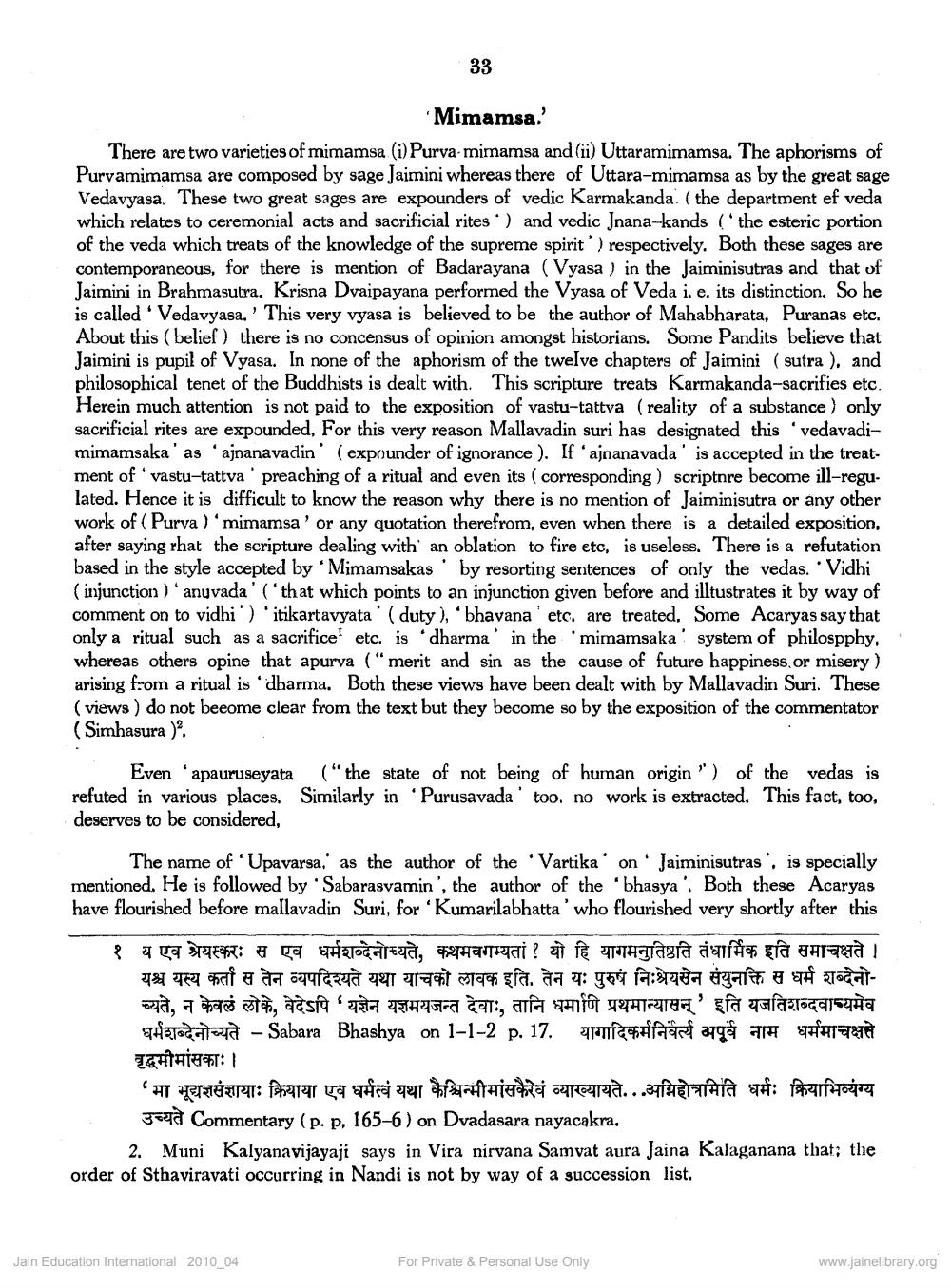________________
33
Mimamsa.' There are two varieties of mimamsa (i) Purva- mimamsa and (ii) Uttaramimamsa. The aphorisms of Purvamimamsa are composed by sage Jaimini whereas there of Uttara-mimamsa as by the great sage Vedavyasa. These two great sages are expounders of vedic Karmakanda. ( the department ef veda which relates to ceremonial acts and sacrificial rites) and vedic Jnana-kands ('the esteric portion of the veda which treats of the knowledge of the supreme spirit) respectively. Both these sages are contemporaneous, for there is mention of Badarayana (Vyasa ) in the Jaiminisutras and that of Jaimini in Brahmasutra. Krisna Dvaipayana performed the Vyasa of Veda i. e. its distinction. So he is called ' Vedavyasa.' This very vyasa is believed to be the author of Mahabharata, Puranas etc. About this ( belief) there is no concensus of opinion amongst historians. Some Pandits believe that Jaimini is pupil of Vyasa. In none of the aphorism of the twelve chapters of Jaimini (sutra ), and philosophical tenet of the Buddhists is dealt with. This scripture treats Karmakanda--sacrifies etc. Herein much attention is not paid to the exposition of vastu-tattva (reality of a substance ) only sacrificial rites are expounded, For this very reason Mallavadin suri has designated this 'vedavadimimamsaka' as 'ajnanavadin' (expounder of ignorance). If 'ajnanavada' is accepted in the treatment of vastu-tattva' preaching of a ritual and even its (corresponding) scriptnre become ill-regulated. Hence it is difficult to know the reason why there is no mention of Jaiminisutra or any other work of (Purva) 'mimamsa' or any quotation therefrom, even when there is a detailed exposition, after saying rhat the scripture dealing with an oblation to fire etc, is useless. There is a refutation based in the style accepted by Mimamsakas' by resorting sentences of only the vedas. Vidhi (injunction )'anuvada' ('that which points to an injunction given before and illtustrates it by way of comment on to vidhi') 'itikartavyata' (duty ), 'bhavana' etc. are treated. Some Acaryas say that only a ritual such as a sacrifice etc. is dharma' in the 'mimamsaka system of philospphy. whereas others opine that apurva (“merit and sin as the cause of future happiness, or misery) arising from a ritual is dharma. Both these views have been dealt with by Mallavadin Suri. These (views ) do not beeome clear from the text but they become so by the exposition of the commentator (Simhasura )
Even 'apauruseyata ("the state of not being of human origin") of the vedas is refuted in various places. Similarly in 'Purusavada' too. no work is extracted. This fact, too, deserves to be considered,
The name of 'Upavarsa,' as the author of the Vartika' on Jaiminisutras', is specially mentioned. He is followed by Sabarasvamin', the author of the 'bhasya'. Both these Acaryas have flourished before mallavadin Suri, for 'Kumarilabhatta' who flourished very shortly after this
१ य एव श्रेयस्करः स एव धर्मशब्देनोच्यते, कथमवगम्यतां? यो हि यागमनुतिष्ठति तंधार्मिक इति समाचक्षते ।
यश्च यस्य कर्ता स तेन व्यपदिश्यते यथा याचको लावक इति. तेन यः पुरुषं निःश्रेयसेन संयुनक्ति स धर्म शब्देनोच्यते, न केवलं लोके, वेदेऽपि ' यज्ञेन यज्ञमयजन्त देवाः, तानि धाणि प्रथमान्यासन्' इति यजतिशब्दवाच्यमेव
delodce - Sabara Bhashya on 1-1-2 p. 17. T a ri argë THA T वृद्धमीमांसकाः। 'मा भूद्यज्ञसंज्ञायाः क्रियाया एव धर्मत्वं यथा कैश्चिन्मीमांसकैरेवं व्याख्यायते...अग्निहोत्रमिति धर्मः क्रियाभिव्यंग्य Jā Commentary (p. p. 165-6) on Dvadasara nayacakra.
2. Muni Kalyanavijayaji says in Vira nirvana Samvat aura Jaina Kalaganana that; the order of Sthaviravati occurring in Nandi is not by way of a succession list.
Jain Education International 2010_04
For Private & Personal Use Only
www.jainelibrary.org




